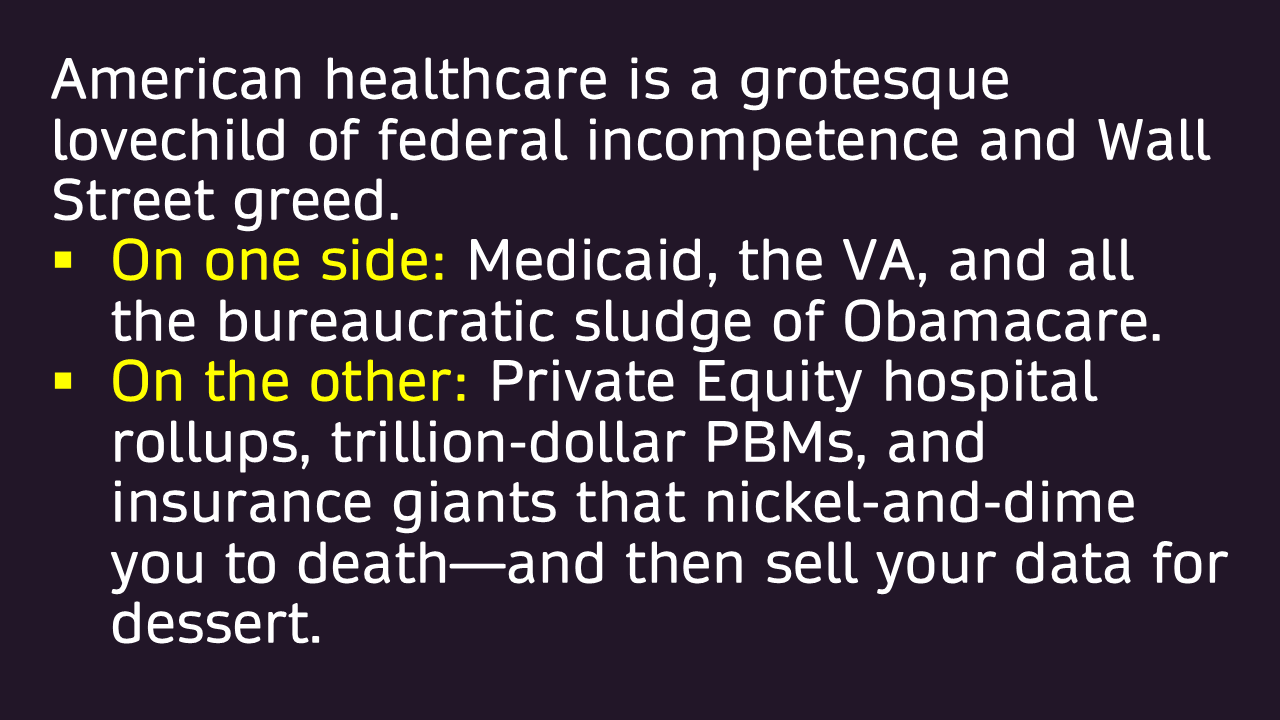I just read, “How Chronic Disease Became the Biggest Scourge in American Health,” in the May 14 edition of the Wall Street Journal, and I can’t help but share my thoughts on it and all of the things it failed to mention.
Chronic disease is killing us? No kidding. What tipped you off—the 90 million on Medicaid who can’t get an appointment, or the $12,000 bill for insulin?
Spare me the headlines. We’ve known this was coming for years. It’s not just diet or lifestyle. It’s the system. We engineered this collapse.
What we have in American healthcare is a grotesque lovechild of federal incompetence and Wall Street greed. On one side: Medicaid, the VA, and all the bureaucratic sludge of Obamacare. On the other: Private Equity hospital rollups, trillion-dollar PBMs, and insurance giants that nickel-and-dime you to death—and then sell your data for dessert.
This isn’t reformable. It’s not broken—it’s functioning exactly how it was designed. Delays, denials, waste, code-stacking, middlemen with middlemen. And always, someone clipping 5% off the top just for being adjacent to the transaction.
Meanwhile, your primary care doc is drowning in 3,000 patients. They’ve got 11 minutes and 15 seconds for you—maybe—because they’ve got 15 prior auths to beg for and 17 EMR alerts blinking red. Prevention? Forget it. They don’t even have time to read your chart before walking into the exam room.
And that's if you can find a doctor. Because we’ve built a system where 340 million people are expected to live on fast food, stress, and drive-thru urgent care clinics staffed by temps.
Here’s the part they don’t want to admit: chronic disease is profitable. It’s a goldmine. Not just the conditions, but the complications. The treatments. The recurring scripts. The hospitalizations that could’ve been avoided with 60 minutes of real primary care two years earlier.
So yeah, of course we’re sick. Of course we’re dying younger.
What are we doing about it at The Mahoney Group?
We’re blowing it up. Piece by piece.
Largely, we’ve ditched the carriers. Ditched the bloated “network discounts” that don’t mean a thing when your deductible’s $9,000 and the urgent care doc thinks your name is "Chart #1178." We are out.
Instead?
Direct Primary Care. 500 patients. No billing codes. Just doctors who actually have time to practice medicine. You know, that thing they went to school for?
Transparent PBMs. None of this rebate hoarding or mystery pricing. We pass every discount straight through. You want to know what your meds cost? Ask. We’ll show you.
Independent TPAs who aren’t married to the carriers and actually fight for your plan—not against it.
And yes, Reference-Based Pricing. Because paying $78,000 for a two-night hospital stay is absurd. We peg our rates to actual costs with a fair buffer. We don’t write blank checks.
And it works.
We’ve built plans that save money and get people healthier. Plans that aren’t beholden to Wall Street or Washington. Plans that aren’t crafted in some glass tower in Hartford but by people who actually give a damn.
It’s not theoretical. It’s working right now for our clients. In the real world. With real people. Who now have real doctors again.
But don’t expect anyone in the status quo to cheer. Because when you start doing this right, you disrupt a lot of folks who’ve been making a very comfortable living off doing it wrong.
You start costing CVS money. You start questioning United’s logic. You shine a light on the “nonprofit” hospital that bought a new wing while your employee was GoFundMe-ing her life-saving cancer treatment.
And the machine doesn’t like that.
So yeah, we’re fighting upstream. But we’re not alone. More employers are waking up. They're tired of writing $2 million checks each year to a system that actively works against their employees.
And when they’re ready to build something better, we’re here.
This mess won’t be fixed from the inside. It has to be rebuilt from the ground up—with care, not codes. With relationships, not runarounds.
We’re not waiting for Congress. We’re not holding out for a hero. We’re already doing the work.
And we invite you to join us.




